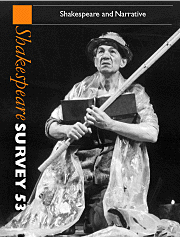Book contents
- Frontmatter
- Shakespeare’s Narremes
- Stepping Out of Narrative Line: A Bit of Word, and Horse, Play in Venus and Adonis
- A ‘consummation devoutly to be wished’: The Erotics of Narration in Venus and Adonis
- Echoes Inhabit a Garden: The Narratives of Romeo and Juliet
- A Midsummer Night’s Dream: Comedy as Apotrope of Myth
- Plutarch, Insurrection, and Dearth in Coriolanus
- Shakespeare, Crossing the Rubicon
- Vernacular Criticism and the Scenes Shakespeare Never Wrote
- The Shadow of Lear’s ‘Houseless’ in Dickens
- Shakespearian Margins in George Eliot’s ‘working-day world’
- In Her Father’s Library: Margaret Fuller and the Making of the American Miranda
- The Magician in Love
- Narrative Approaches to Shakespeare: Active Storytelling in Schools
- Monsters, Magicians, Movies: The Tempest and the Final Frontier
- Shakespeare’s Self-Repetitions and King John
- Inside Othello
- The View of London from the North and the Playhouses in Holywell
- Measured Endings: How Productions from 1720 to 1929 Close Shakespeare’s Open Silences in Measure for Measure
- Shakespearian Utopias
- Shakespeare Performances in England, 1999
- Professional Shakespeare Productions in the British Isles January–December 1998
- The Year's Contributions to Shakespearian Study 1 Critical Studies
- 2 Shakespeare’s Life, Times, and Stage
- 3 Editions and Textual Studies
- Books Received
- Index
Measured Endings: How Productions from 1720 to 1929 Close Shakespeare’s Open Silences in Measure for Measure
Published online by Cambridge University Press: 28 March 2007
- Frontmatter
- Shakespeare’s Narremes
- Stepping Out of Narrative Line: A Bit of Word, and Horse, Play in Venus and Adonis
- A ‘consummation devoutly to be wished’: The Erotics of Narration in Venus and Adonis
- Echoes Inhabit a Garden: The Narratives of Romeo and Juliet
- A Midsummer Night’s Dream: Comedy as Apotrope of Myth
- Plutarch, Insurrection, and Dearth in Coriolanus
- Shakespeare, Crossing the Rubicon
- Vernacular Criticism and the Scenes Shakespeare Never Wrote
- The Shadow of Lear’s ‘Houseless’ in Dickens
- Shakespearian Margins in George Eliot’s ‘working-day world’
- In Her Father’s Library: Margaret Fuller and the Making of the American Miranda
- The Magician in Love
- Narrative Approaches to Shakespeare: Active Storytelling in Schools
- Monsters, Magicians, Movies: The Tempest and the Final Frontier
- Shakespeare’s Self-Repetitions and King John
- Inside Othello
- The View of London from the North and the Playhouses in Holywell
- Measured Endings: How Productions from 1720 to 1929 Close Shakespeare’s Open Silences in Measure for Measure
- Shakespearian Utopias
- Shakespeare Performances in England, 1999
- Professional Shakespeare Productions in the British Isles January–December 1998
- The Year's Contributions to Shakespearian Study 1 Critical Studies
- 2 Shakespeare’s Life, Times, and Stage
- 3 Editions and Textual Studies
- Books Received
- Index
Summary
I am even willing to believe that the marriages that conclude Measure for Measure were not irresponsibly cobbled together because the dramatist needed a happy ending, but are appropriately disturbing at the end of a disturbing play.
(E. A. J. Honigmann, 'Shakespeare as a Reviser', p. IO)In the Preface to his edition of Shakespeare's plays, and even as he vigorously defended the playwright against attacks by other neo-classical critics, Samuel Johnson nonetheless also offered his own survey of Shakespeare's weaknesses. Among the better-known provocative remarks is his assessment of the endings of the plays:
It may be observed, that in many of his plays the latter part is evidently neglected. When he found himself near the end of his work, and in view of his reward, he shortened the labour, to snatch the profit. He therefore remits his efforts where he should most vigorously exert them, and his catastrophe is improbably produced or imperfectly represented.
That Measure for Measure, in particular, was taken to be an example of Shakespeare's tendency to 'remit his efforts', and that these failures created problems about the ending of the play symptomatic about larger issues of genre, plot, and character is testified to by Charlotte Lennox's often-quoted criticism:
The comic Part of Measure for Measure is all Episode, and has no Dependence on the principal Subject, which even as Shakespear has managed it, has none of the Requisites of Comedy, great and flagrant Crimes, such as those of Angelo, in Measure for Measure, are properly the Subject of Tragedy, the Design of which is to shew the fatal Consequences of those Crimes and the Punishment that never fails to attend them. The light Follies of a Lucio may be exposed, ridiculed and corrected in Comedy.
- Type
- Chapter
- Information
- Shakespeare SurveyAn Annual Survey of Shakespeare Studies and Production, pp. 213 - 232Publisher: Cambridge University PressPrint publication year: 2000
- 2
- Cited by

